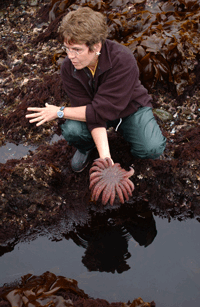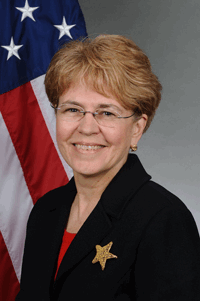A Sea Change for Ocean Management
Air Date: Week of October 9, 2009

Jane Lubchenco is administrator of NOAA (Photo: Courtesy of the University of Oregon)
The Obama administration is proposing a sea change in how we manage our oceans, including a comprehensive policy on fishing, offshore energy, and shipping. Some scientists call it a needed remedy for our depleted coasts. Some fishermen worry they’ll be forced off the water. Host Jeff Young went to a hearing in Rhode Island and talked with marine officials, fishermen and NOAA Administrator Jane Lubchenco about using our oceans without using them up.
Transcript
[THEME]
YOUNG: From the Jennifer and Ted Stanley Studios in Somerville, Massachusetts - this is Living on Earth. I’m Jeff Young. About five years ago, we got a wake up call with two reports describing oceans in crisis: plummeting fish populations; coastal habitat lost to sprawl; dead zones due to nutrient runoff. It was a pretty gloomy picture.
Well, now the federal government’s following recommendations from those reports with what could be a sea change for ocean management. The Obama administration has proposed a comprehensive oceans policy—one that pulls together plans for fishing, offshore energy, coastal protection and shipping—jobs that are now scattered across some 20 government agencies.
[HUBBUB; VOICES MURMURING IN BUSY ROOM]
YOUNG: A task force of top marine and environmental officials is getting feedback on the plan during a listening tour along the country’s coastline.
[TAPPING ON MICROPHONE]
SUTLEY: Hello, if you can all find a seat we’re about to started as soon as we…
YOUNG: Hundreds gathered for an afternoon hearing in Providence, Rhode Island—folks in the ocean state had a lot to say about oceans management. Greg Garrett was concerned about whales.
GARRETT: We now let our military with reckless abandon kill marine mammals. And, if your national policy doesn’t actually stop that then you haven’t done anybody any good.
YOUNG: Fishing communities advocate Angela Sanfilippo said trying to work with the government often leads to frustration.
SANFILIPPO: We know that if we don’t have a healthy ocean there’s no fish. We worked through these years with a lot of government agencies but it’s very difficult-- the army corps of engineers, the department of navy, the coast guard. It’s impossible to protect the ocean when you have to deal with so many people.
YOUNG: Fisherman Brian Loftis worried the plan could force guys like him off the water.
LOFTIS: There’s enough for everyone if they’d manage it properly, but that’s not what they’re trying to do. They’re trying to shrink everyone down, get rid of half the boats, and then the other ones will be owned by big corporations. The small independent guy is gonna go the way of the farmer, bye bye.

(Courtesy of Deepwater Wind)
YOUNG: The hearing went on into the night. Scientists asked for ecosystem-based management; energy developers urged more offshore wind power; ship captains argued against putting windmills in their way. What emerged here in nation’s smallest state was a microcosm of the issues and challenges for all of the country’s coasts.
[WAVES CRASHING; WIND BLOWING ON BEACH]
YOUNG: The next day I tagged along as task force members hit the beach with locals who explained what lessons little Rhode Island might hold. Grover Fugate directs the state’s Coastal Resource Management Council. He says the feds could learn from the planning that kept these dunes and salt ponds healthy even amid dense population.
FUGATE: They’re trying to understand what’s called marine spatial planning, which is essentially looking at the uses that are in the waterside and how they interact and how they can be planned rationally. And that’s what we’ve been doing in Rhode Island for 26 years. And we now have this ocean planning initiative that’s reaching much further out than any program has done before with an eye to where we can put renewable energy in these waters.

Jane Lubchenco
YOUNG: Like a lot of east coast states, Rhode Island is looking to its windy coast for energy. But some offshore wind projects are mired in controversy and delay. Deepwater Wind managing director Jim Lanard hopes his company can avoid that.
LANARD: Marine spatial planning, ocean zoning, is very important as we put industrial uses out into the oceans we have industrial fishing uses and now we’re going to have wind energy out there, as well. There needs to be coordination and collaboration.
YOUNG: So, from where we’re standing, where out there do you think your project might happen?
LANARD: The utility-scale project will be a little bit to our left, about 12 to 15 miles off the coast. There will be about 100 turbines out there, spread about a half mile apart. The utility-scale wind park will power 125 to 150,000 homes every year.
YOUNG: By going farther from shore, Deepwater would make its turbines less visible to beach tourists. But that could put windmills in the waters that fishermen have relied on for centuries. Lobsterman Lanny Dellinger says fishermen are trying to accommodate others.
DELINGER: There’s no alternative. I mean, the Obama administration has made it quite clear we’re gonna have these alternative energy projects. Now it’s time to figure out how we can do both. I think it’s a matter of sizing the industry so that we can have a sustainable fishery and a sustainable industry to harvest those fish.
YOUNG: Sizing the industry, though, that means some people aren’t going to be fishing anymore?
DELINGER: Absolutely. There’s gonna be winners and losers in the process. The best thing we can do is be part of the process early on, get a seat at the table with developers and scientists and help them mitigate those impacts.
YOUNG: There’s a lot here for the federal Ocean policy task force members like Jane Lubchenco to think about.
LUBCHENCO: I think it’s fair to say that the ocean is becoming an increasingly a crowded place. We are see increasing uses and also increasing conflicts.

Jane Lubchenco is administrator of NOAA (Photo: Courtesy of the University of Oregon)
YOUNG: Lubchenco is a highly respected marine ecologist and, since March, she’s been administrator of NOAA, the National Oceanic and Atmospheric Administration. I spoke with her about what she wants this new ocean policy to achieve.
LUBCHENCO: It’s pretty clear that it’s high time we take a more thoughtful look at what combination of activities can coexist in the ocean. If we want to have vibrant coastal communities and coastal economies, if we want the range of activities that people tell us they want from oceans, we really need to have healthy, resilient ocean and coastal ecosystems.
YOUNG: The state of the oceans sounds so dire. And, I understand you’re doing good things here, but they sound very bureaucratic - a reorganizing the flow chart sort of changes. Is that kind of change really going to do what we need given how seriously bad things are with our oceans?
LUBCHENCO: Both of the oceans commissions recognized that there are many problems that exist in oceans and they are only escalating with climate change; it’s sort of an overlay along with ocean acidification on top of a lot of the other ocean challenges. Both of them though pointed to one of the underlying drivers of change is that there is no integration, there’s no coordination. There is no mechanism for considering the health of the system as policies are being made.
So part of the challenge is to take a step back and say how can we be smarter about using oceans without using them up? And that’s very different from sort of the piece meal, sector by sector, one crisis management at a time that we have been doing over the last, I guess, pretty much forever.
YOUNG: Is there time to bring some of these fisheries that are plummeting back, is there time to stop what’s happening to our coral reefs, our coastlines?
LUBCHENCO: I take hope from the knowledge from my personal experience about the resiliency that does exist in many ocean ecosystems when they are allowed to recover they actually can. And so I think there’s actually a dual message here: one of urgency but, there is also great hope. So we believe that it is time to move ahead very aggressively in doing more recovery, but focusing not just on individual stocks of fish but on the health of the system. Because that, in fact, is what in the end will be important to people. Healthy oceans matter.
YOUNG: You can hear a longer interview with NOAA administrator Jane Lubchenko, and read a draft of the new ocean policy at our website, LOE dot ORG. The ocean’s task force has two more public hearings this month in New Orleans and Cleveland. The final plan goes to the President in December.
Links
Click here to see multi-use planning maps
Click here to hear our full interview with Jane Lubchenco
Read the draft report from the Obama administration’s interagency oceans task force
Living on Earth wants to hear from you!
Living on Earth
62 Calef Highway, Suite 212
Lee, NH 03861
Telephone: 617-287-4121
E-mail: comments@loe.org
Newsletter [Click here]
Donate to Living on Earth!
Living on Earth is an independent media program and relies entirely on contributions from listeners and institutions supporting public service. Please donate now to preserve an independent environmental voice.
NewsletterLiving on Earth offers a weekly delivery of the show's rundown to your mailbox. Sign up for our newsletter today!
 Sailors For The Sea: Be the change you want to sea.
Sailors For The Sea: Be the change you want to sea.
 The Grantham Foundation for the Protection of the Environment: Committed to protecting and improving the health of the global environment.
The Grantham Foundation for the Protection of the Environment: Committed to protecting and improving the health of the global environment.
 Contribute to Living on Earth and receive, as our gift to you, an archival print of one of Mark Seth Lender's extraordinary wildlife photographs. Follow the link to see Mark's current collection of photographs.
Contribute to Living on Earth and receive, as our gift to you, an archival print of one of Mark Seth Lender's extraordinary wildlife photographs. Follow the link to see Mark's current collection of photographs.
 Buy a signed copy of Mark Seth Lender's book Smeagull the Seagull & support Living on Earth
Buy a signed copy of Mark Seth Lender's book Smeagull the Seagull & support Living on Earth

